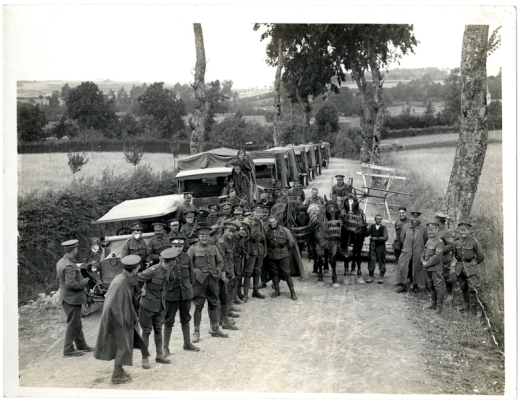The Botlon Branch is delighted that several A level history students attend branch lectures on a regular basis. Over the next few months, we hope to feature reports on our branch lectures written by our student members. The first of these is a report on our December lecture, written by Alexandra Hopkinson of Bolton School Girls’ Division.
‘Will the Real Great War Please Stand Up? The Development of Historiography Over the Last 100 Years.’

“A cavalry ammunition park near Aire, France (Photo 24-218)” by H. D. Girdwood – This file has been provided by the British Library from its digital collections.
On Monday 1st December, military historian Rob Thompson delivered a thought provoking lecture which challenged the accepted view that World War One was simply a pointless slaughter. In particular, he was critical of the version of the war that has been popularised by Blackadder and poets such as Siegfried Sassoon and Wilfred Owen (who, Thompson argues, were not representative of the common soldier). This approach, often promoted by schoolteachers, considers the futility of a war fought by the common soldier whilst generals avoided danger. However, Thompson revised this popular opinion, and instead explored the notion that many generals did in fact serve on the front line and were killed (plus, when General Sir Douglas Haig died in 1928, he was mourned by thousands who lined the streets of London), and moreover that the Great War was not the pointless exercise condoned by many.
Upon beginning the lecture, Thompson disputed the accuracy of the depictions of the Great War which have formed much of public consensus: the work of poets. As an English Literature student, my initial reaction had been to reject such contradictions; however, Thomson argued that the work of Wilfred Owen, for example, did not reflect that of the views of ordinary ‘Tommies’. In consolidating this hypothesis, Thompson cited the reluctant view of his Great-Grandfather, who deemed the Great War to be very different to the ‘pointless slaughter’ often expressed in poetic works; Thompson additionally argued that the poets themselves differed greatly to the views which they artistically presented in their works. Due to the flawed Versailles treaty which concluded World War One, the contrast with the ‘good’ war of 1939-1945, and the 1960s peace movement, the Great War has been deemed as a terrible war, fought for the wrong reasons. Thompson’s lecture was particularly relevant given the recent debate over how to commemorate the centenary of World War One. Overall, it was thoroughly captivating, and raised issues which many people had chosen to ignore, highlighting greatly the artistic vision of the emotional and intellectual need to remember and redefine events, rather than the true validity of such interpretations.
